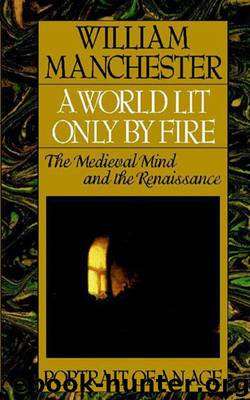A world lit only by fire: the medieval mind and the Renaissance : portrait of an age by William Manchester

Author:William Manchester
Language: eng
Format: mobi, epub
Tags: Europe, Learning and scholarship, 500-1500, Education, Medieval, General, Renaissance, Learning and scholarship - History - Medieval, History
ISBN: 9780316545310
Publisher: Little, Brown
Published: 1992-04-15T10:00:00+00:00
would
have
been
weakened,
probably fatally.
HOW MUCH Lisbon learned about
the
Valladolid
audience
is
unknown. Probably very little. But
it
was
enough:
a
seasoned
Portuguese mariner, familiar with
the Tesouraria’s holiest secrets, had
been commissioned by the Castilian
monarch to pry the Spice Islands
loose from Portugal. His fleet was
already forming up. It is a measure
of Manuel’s alarm that he instructed
his ambassador to Madrid, Álvaro
da
Costa,
to
sabotage
the
expedition. Fortunately for history,
Costa was a fool. He attempted to
coerce Magellan, and when that
failed he tried to intimidate the
Spanish king, first telling him that
Portugal would regard continued
support of the venture as an
unfriendly act, then that Magellan
and Faleiro wanted to return home
but had been denied permission to
leave Seville—a lie which, when
exposed, resulted in the cold
dismissal of the bumbling envoy.
Nevertheless, attempts to sandbag
the undertaking continued, and some
of them were a nuisance. When
Magellan
began
signing
up
crewmen,
Sebastian
Álvarez,
Portugal’s consul on the spot, urged
them to desert. He also spread
vicious
rumors;
cornering
the
flota’s four Spanish captains, he
whispered to them that their
capitán-general was a double agent
who planned to lower Spain’s
colors, raise Portugal’s, and defect
with the entire armada.
This ugly seed fell on fertile
ground. Only one of the four was an
experienced professional mariner;
the other three were haughty young
dons, Castilian courtiers held in
high favor by their sovereign,
resentful of their subordination to a
foreigner. Thus the enterprise began
to accumulate difficulties long
before its five anchors were
weighed. Because of Álvarez’s
dirty tricks—he fed gossips tales
that
the
mission
was
highly
dangerous
and
the
vessels
unseaworthy—the recruitment of
seamen bogged down. Those who
finally signed on were the dregs of
the
waterfront:
ragged,
filthy,
diseased drifters who babbled to
one another in broken Spanish,
Portuguese,
Italian,
German,
English—even
Arabic.
Meddlesome officials of the port of
Seville
tried
to
reject
the
Portuguese among them, including
several
who
were
Magellan
relatives; Duarte Barbosa, his
brother-in-law;
and
Estevão
Gomes, one of the ablest pilots in
either Iberian country.
The
capitán-general
was
thwarted again and again. He
ordered equipment; it failed to
arrive. Funds which had been
promised by Carlos and his privy
council miscarried. Magellan, his
patience
endless,
successfully
appealed to the king and royal
agents. Finally he confronted the
most
intractable
obstacle:
his
partner. Faleiro, who had never
been to sea, insisted that they share
a joint command. It was an
impossible demand; had it been
met, the ships would not have
survived the first leg of their long
journey. Precisely how the admiral
deflected this challenge is unknown.
Some accounts say that Faleiro was
declared insane; others tell of an
imperial edict appointing him
commander of a second expedition,
which never sailed. In any event, he
turned his maps and astronomical
tables over to Magellan, and the
five bowsprits finally took the bone
in their teeth on September 20,
1519, sailing westward before the
wind, under taut sails bearing
Spain’s royal cross of St. James.
The capitán-general watched
the mainland recede in the wake of
Trinidad—his
flagship,
or
capitana. Then he opened an
unsettling, last-minute dispatch from
his father-in-law, relaying reports
of a conspiracy between three of the
Spanish noblemen. The leader was
Juan de Cartagena, commander of
San Antonio and an intimate of the
bishop of Burgos, thought by some
to be the bishop’s bastard. When the
right
moment
arrived,
Diego
Barbosa had been told, Cartagena
would give the signal for a mutiny.
Download
A world lit only by fire: the medieval mind and the Renaissance : portrait of an age by William Manchester.epub
This site does not store any files on its server. We only index and link to content provided by other sites. Please contact the content providers to delete copyright contents if any and email us, we'll remove relevant links or contents immediately.
| Africa | Americas |
| Arctic & Antarctica | Asia |
| Australia & Oceania | Europe |
| Middle East | Russia |
| United States | World |
| Ancient Civilizations | Military |
| Historical Study & Educational Resources |
Room 212 by Kate Stewart(5105)
The Crown by Robert Lacey(4807)
Endurance: Shackleton's Incredible Voyage by Alfred Lansing(4769)
The Iron Duke by The Iron Duke(4349)
The Rape of Nanking by Iris Chang(4203)
Joan of Arc by Mary Gordon(4101)
Killing England by Bill O'Reilly(3996)
Say Nothing by Patrick Radden Keefe(3975)
I'll Give You the Sun by Jandy Nelson(3429)
Shadow of Night by Deborah Harkness(3361)
Hitler's Monsters by Eric Kurlander(3328)
Mary, Queen of Scots, and the Murder of Lord Darnley by Alison Weir(3204)
Blood and Sand by Alex Von Tunzelmann(3195)
Eleanor & Park by Rainbow Rowell(3153)
Darkest Hour by Anthony McCarten(3119)
Margaret Thatcher: The Autobiography by Thatcher Margaret(3080)
Book of Life by Deborah Harkness(2932)
Red Famine: Stalin's War on Ukraine by Anne Applebaum(2929)
The One Memory of Flora Banks by Emily Barr(2857)
